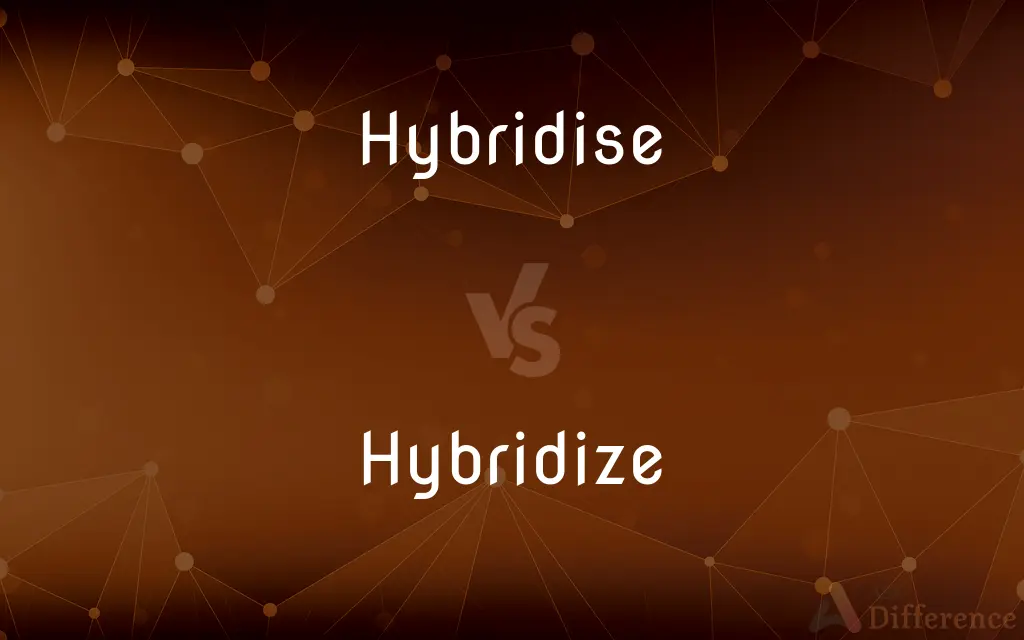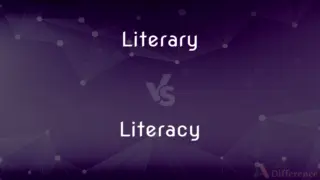Hybridise vs. Hybridize — What's the Difference?
Edited by Tayyaba Rehman — By Maham Liaqat — Updated on April 7, 2024
Hybridise and hybridize both refer to the process of combining different elements, particularly in biology, but differ in spelling based on British and American English usage, respectively.

Difference Between Hybridise and Hybridize
Table of Contents
ADVERTISEMENT
Key Differences
Hybridise is the British English spelling of the verb that describes the process of creating a hybrid, which can involve combining different species of plants or animals to produce a mix with characteristics of both parents. This term is often used in contexts related to genetics, agriculture, and biodiversity. On the other hand, hybridize is the American English spelling of the same verb. The difference in spelling reflects the broader differences between British and American English conventions, without indicating any difference in meaning or application of the terms.
The process of hybridisation (British English) or hybridization (American English) is crucial in scientific research and commercial agriculture, allowing for the development of crops with desired traits such as disease resistance, higher yield, and improved nutritional value. While the spelling varies, the underlying scientific principles and goals remain consistent across regions, emphasizing the universality of the concept despite linguistic differences.
Hybridising plants or animals involves crossing different strains or species to produce offspring that may exhibit the best traits of both parents. Scientists and breeders use both terms, hybridise and hybridize, depending on their location or the publication standards of scientific journals they are contributing to. This process is not limited to any specific geographic location or scientific community, showcasing the global application of hybridization techniques.
In literature and daily communication, the choice between hybridise and hybridize might also reflect the writer's or speaker's cultural or educational background. British English speakers and writers are more likely to use hybridise, while American English speakers and writers tend to prefer hybridize. However, the context in which either term is used can easily determine its meaning, ensuring clear communication despite the spelling difference.
Despite the spelling variations, the importance of hybridization in advancing agricultural practices, enhancing biodiversity, and facilitating scientific research is universally recognized. The choice between hybridise and hybridize does not affect the understanding of the process it describes, highlighting how language adapts to accommodate regional differences while maintaining clear communication about complex scientific concepts.
ADVERTISEMENT
Comparison Chart
Definition
To produce a hybrid through the cross-breeding of different species or varieties.
To produce a hybrid through the cross-breeding of different species or varieties.
Usage
Preferred in British English-speaking countries.
Preferred in American English-speaking countries.
Context
Commonly used in genetics, agriculture, and biodiversity discussions.
Commonly used in genetics, agriculture, and biodiversity discussions.
Example
Crossing two different species of roses to produce a new variety.
Crossing two different species of roses to produce a new variety.
Implications
Indicates regional spelling preferences without affecting the scientific process.
Indicates regional spelling preferences without affecting the scientific process.
Compare with Definitions
Hybridise
Combine diverse elements.
The artist hybridised classical and modern techniques in her paintings.
Hybridize
Engage in hybridization.
The biologist's work involves hybridizing different strains of bacteria for research.
Hybridise
Produce offspring with mixed traits.
By hybridising these plants, we obtained flowers with new colors.
Hybridize
Produce offspring with mixed traits.
Hybridizing these dog breeds resulted in a healthier lineage.
Hybridise
Cross different species.
They hybridised a lion and a tiger to create a liger.
Hybridize
Create a genetic mix.
Scientists hybridize corn to enhance its nutritional value.
Hybridise
Engage in hybridisation.
The company specialises in hybridising rare orchids for collectors.
Hybridize
Cross different species.
A zebra and a horse were hybridized to produce a zorse.
Hybridise
Create a genetic mix.
Researchers hybridised two tomato varieties to increase disease resistance.
Hybridize
Combine diverse elements.
The engineer hybridized solar and wind technology for efficient energy production.
Hybridise
Standard spelling of hybridize
Hybridize
Cross-breed (individuals of two different species or varieties)
A few gardeners hybridize their roses
Hybridise
Breed animals or plants using parents of different races and varieties;
Cross a horse and a donkey
Mendel tried crossbreeding
These species do not interbreed
Hybridize
To produce hybrids; crossbreed.
Hybridize
To form base pairs between complementary regions of two strands of DNA that were not originally paired.
Hybridize
To cause to produce a hybrid; crossbreed.
Hybridize
To form a mixture of any kind.
Hybridize
(transitive) To cross-breed animals or plants to form hybrids.
Hybridize
(intransitive) To produce hybrid offspring; to interbreed.
Hybridize
(transitive) To construct a hybrid word from elements of different languages.
Hybridize
(physics) To combine atomic orbitals mathematically to form hybrid orbitals.
Hybridize
(biochemistry) To combine complementary subunits of multiple biological macromolecules.
Hybridize
To render hybrid; to produce by mixture of stocks.
Hybridize
To produce hybrid offspring; to interbreed; to cross.
Hybridize
Breed animals or plants using parents of different races and varieties;
Cross a horse and a donkey
Mendel tried crossbreeding
These species do not interbreed
Common Curiosities
Can both terms be used interchangeably?
Yes, they can be used interchangeably, though it is best to maintain consistency with the chosen variant of English.
Why are there two spellings for the same process?
The two spellings reflect the differences between British and American English conventions.
Is there a difference in meaning between hybridise and hybridize?
No, there is no difference in meaning; the variation lies solely in the spelling preferred by British and American English.
Does the choice of spelling affect scientific understanding?
No, the choice of spelling does not impact the scientific understanding of the process.
What are the benefits of hybridising/hybridizing plants?
Benefits include improved resilience, higher yield, better nutritional values, and disease resistance.
Are hybridise and hybridize used outside of biology?
Yes, these terms can be used metaphorically in various contexts to describe combining different elements to create something new.
Is one spelling more correct than the other?
No, neither spelling is more correct; the choice depends on regional language conventions.
What role does hybridisation/hybridization play in evolution?
Hybridisation can contribute to genetic diversity and the emergence of new species, playing a complex role in evolutionary processes.
How do scientists decide which spelling to use?
Scientists typically use the spelling that aligns with the publication standards of the journals in which they are publishing or the regional spelling norms of their institution.
How is hybridisation/hybridization used in agriculture?
It is used to develop crops with specific advantageous traits, such as drought resistance or increased productivity.
Can hybridisation/hybridization occur naturally?
Yes, hybridisation can occur naturally in the wild, as well as through intentional breeding or genetic engineering.
Is hybridisation/hybridization controversial?
While the process itself is a standard scientific practice, its applications, particularly in genetic modification, can be subjects of ethical and environmental debates.
Are hybrids always fertile?
Not always; some hybrids, particularly those between different species, may be sterile or have reduced fertility.
Can hybridisation/hybridization affect biodiversity?
Yes, it can both positively and negatively impact biodiversity, depending on how it is applied and managed.
Can any two species be hybridised/hybridized?
Not all species can be hybridised due to genetic incompatibilities, though many plants and some animal species can successfully produce hybrids.
Share Your Discovery

Previous Comparison
Literary vs. Literacy
Next Comparison
Bodice vs. CorsetAuthor Spotlight
Written by
Maham LiaqatEdited by
Tayyaba RehmanTayyaba Rehman is a distinguished writer, currently serving as a primary contributor to askdifference.com. As a researcher in semantics and etymology, Tayyaba's passion for the complexity of languages and their distinctions has found a perfect home on the platform. Tayyaba delves into the intricacies of language, distinguishing between commonly confused words and phrases, thereby providing clarity for readers worldwide.













































